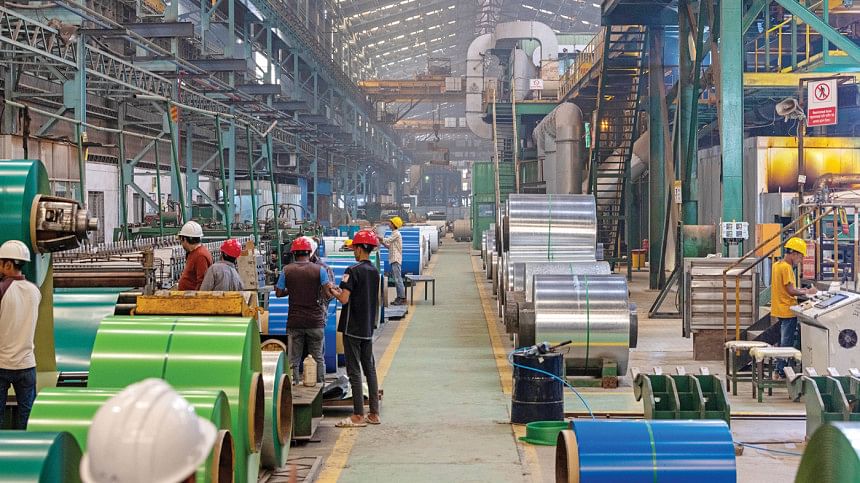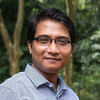Abul Khair Steel aims to cut ecological footprint

Steel factories are often seen as some of the biggest culprits of environmental pollution due to their massive energy consumption, heavy water use and harmful emissions.
However, by placing environmental responsibility alongside growth at the core of its business, Abul Khair Steel (AKS) is showing how heavy industrial manufacturing can still minimise its ecological footprint.
In Chattogram's Sitakunda area, two AKS factories are producing steel while adopting rainwater harvesting and utilising solar power.
Located by the Dhaka-Chattogram highway, these factories, which produce long and flat steel, are equipped with fume treatment facilities that remove harmful particles from emissions before releasing them into the atmosphere.
The long steel plant, spanning 750 acres, features two rainwater reservoirs covering over 50 acres.
The flat steel unit occupies 300 acres.
Its factories are equipped with fume treatment facilities that remove harmful particles from emissions before releasing them into the atmosphere
The long steel plant alone requires nearly 200,000 litres of water per hour -- enough to fill two Olympic-sized swimming pools daily.
Instead of depleting groundwater resources, AKS depends on rainwater harvesting, as its two reservoirs on 50 acres in nearby hilly areas ensure a year-round water supply.
"Our commitment is to ensure that every drop of water used in our production cycle is either harvested or recycled," said Imran Momin, chief executive officer of AKS, during a recent media interaction at the Sitakunda facility.
"This not only reduces our environmental footprint but also sets an example for other industries to follow," he said.
To address air pollution at the steelmaking units, AKS has installed an advanced fume treatment facility that captures harmful particulates and neutralises pollutants before releasing them into the atmosphere.
Momin said this technology improves air quality, benefiting both workers and the surrounding community.
To further reduce its carbon footprint, AKS has also installed a 12-megawatt solar power facility for its steel factories.
"We do not see environmental responsibility as a burden but as a necessary investment for the future," Momin said. "Cleaner productions lead to long-term economic benefits, including energy efficiency and reduced waste."
For melting scrap, refining it and producing long steel, AKS also has Thermo-Mechanical Treatment (TMT) technology and an Electric Arc Furnace (EAF) refining facility.
Besides, the company operates the country's largest oxygen plant, optimising the steel refining process.
Since entering the flat steel manufacturing sector in 1993, AKS has continuously expanded its product range.
The company's production basket includes corrugated iron sheets (CI sheets), colour-coated steel, zincalume (aluminium and zinc-coated steel), galvanised plain sheets (GP sheets), cold-rolled coils (CR coils) and fibre sheets.
With an annual flat steel production capacity of 6.4 lakh tonnes, AKS products are widely used in both residential and industrial applications.
The company imports hot-rolled coils from Japan, Korea and China as raw materials for its flat steel factory.
The company's flagship brand, "Goru Marka Dhew Tin," a galvanised corrugated (GC) sheet, has been the leading local market brand for over 20 years.
Currently, AKS plans to introduce additional galvanising and colour-coating corrugated sheet lines to cater to both local and international markets, according to company officials.
At present, Bangladesh meets a large portion of its flat steel demand for the electronics and automobile industries by imports from China and India.
AKS looks to reduce this dependency by increasing domestic production. Company officials said AKS is making significant investments in new facilities and infrastructure to achieve this goal.
With the addition of unit-2, the consolidated annual long steel production capacity will reach 3 million tonnes of reinforced steel bars, making AKS the largest steel-making plant in South Asia, according to AKS CEO Momin.
While AKS's main focus remains on meeting domestic demand, the company also sees export potential for its products.
With growing international recognition for Bangladeshi steel, AKS has already begun sending product samples for verification in the United States.
"Our policy is to first ensure that the local market is adequately supplied," said Momin. "However, any surplus production will be directed towards exports, strengthening Bangladesh's position in the global steel industry."
The CEO said, "Going green is not just a choice but a necessity for long-term success."
The company currently employs more than 5,340 people in its long steel division, with plans to add 1,800 more with the expansion of rolling unit-2.
As a conglomerate, Abul Khair Group employs more than 55,000 people across various industries.

 For all latest news, follow The Daily Star's Google News channel.
For all latest news, follow The Daily Star's Google News channel. 



Comments